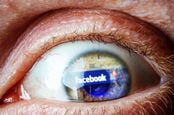This article is more than 1 year old
PSA: You are now in the timeline where Facebook and pals are torn a new one by, er, Borat star Sacha Baron Cohen
The Dictator leading man says web giants would run 'Final Solution' ads for Hitler
Updated On Thursday, in New York City, actor and comedian Sacha Baron Cohen eviscerated Facebook, Google, and Twitter for facilitating the spread of hate and violence and threatening democracy.
Speaking at the the Anti-Defamation League's summit on anti-Semitism and hate, Cohen decried the retreat of reason, civil discourse, and democracy before the spread of demagoguery and conspiracy theories.
"It’s as if the Age of Reason – the era of evidential argument – is ending, and now knowledge is delegitimized and scientific consensus is dismissed," Cohen said. "Democracy, which depends on shared truths, is in retreat, and autocracy, which depends on shared lies, is on the march. Hate crimes are surging, as are murderous attacks on religious and ethnic minorities."
For this state of affairs, Cohen blamed a handful of internet companies that he characterized collectively as the "the greatest propaganda machine in history."
Facebook, Google, Twitter, and YouTube reach billions of people, said Cohen, and they keep users engaged by appealing to our worst instincts with content that triggers outrage and fear.
Cohen argues that the internet allows everything to appear to be equally legitimate. Breitbart, he said, gets consideration alongside the BBC. The rantings of a lunatic share space with the findings of a Nobel Prize winner.
"We have lost, it seems, a shared sense of the basic facts upon which democracy depends," he said.
Cohen allows that social media companies have taken some steps to push back against hate and conspiracy theories on their platforms, but contends their efforts have been superficial.
He credited Google and Twitter with finally taking some responsibility for political ads. But Facebook, he said, will still run ads that lie and will even help ad buyers target them at specific audiences.
"Under this twisted logic, if Facebook were around in the 1930s, it would have allowed Hitler to post 30-second ads on his 'solution' to the 'Jewish problem,'" said Cohen.
Facebook did not responded to a request for comment.
In an email to The Register, a Twitter spokesperson said, "Our rules are clear: There is no place on Twitter for hateful conduct, terrorist organizations or violent extremist groups. Because of these rules, we’ve permanently suspended the accounts of 186 groups, half of which advocate violence against civilians alongside some form of extremist white supremacist ideology."
A Google spokesperson declined to respond on the record, but provided – on background – a list of actions the company has taken to enforce community guidelines, highlight authoritative voices, reduce violent content, and raise standards for content monetization. We were told that The Register could thus cite these talking points and attribute them to "a source familiar with the matter," were we so inclined.
Cohen said he's raising this issue now because he fears pluralistic democracies could be undone in the next twelve months through social media. During this period, both the US and the UK will go to the polls amid ongoing disinformation efforts supported by foreign powers.
Cohen's concern about the influence of social media and internet companies follows a series of scandals in which tech companies have been implicated, including the 2016 US election and the Mueller Report, the Cambridge Analytica scandal, discriminatory advertising practices, and long-simmering antitrust concerns.
US and EU lawmakers have been investigating the role tech companies have played in these and related incidents, but no meaningful legal changes have been enacted in the US to hold tech companies accountable for what happens on their platforms.
In January last year, Germany began enforcing its Network Enforcement Act (Netzwerkdurchsetzungsgesetz or NetzDG), which forces social media sites to take more responsibility for policing hate speech. According to an April report from the Transatlantic Working Group, NetzDG's main impact has been to ensure social media firms take down content within Germany when it violates existing community guidelines. Concerns about the law's side-effects, like chilling free expression and overly aggressive content removal, remain.
Cohen argued tech companies need to be regulated and not left to look after their own affairs. Social media, he contends, is a defective product that companies should fix. And he challenged the law that protects social media companies from liability for what their users say.
"In every other industry, you can be sued for the harm you cause," he said. "Publishers can be sued for libel, people can be sued for defamation. ...But social media companies are largely protected from liability for the content their users post – no matter how indecent it is – by Section 230 of, get ready for it, the Communications Decency Act. Absurd!"
The entirety of Cohen's speech can be seen, wait for it, on YouTube. ®
Updated to add
In a statement emailed to The Register after this story was filed, a spokesperson for Facebook disputed some of Sacha Baron Cohen’s claims.
“Sacha Baron Cohen misrepresented Facebook’s policies,” a company spokesperson said. “Hate speech is actually banned on our platform. We ban people who advocate for violence and we remove anyone who praises or supports it. Nobody – including politicians – can advocate or advertise hate, violence or mass murder on Facebook.”
The Register asked whether Facebook disputes the claim that the social media biz allows ads that are lies or are factually incorrect. We also asked for an explanation of how the company’s hate speech ban can be reconciled with reports that it has accepted more than a $1m in ad dollars over the past year from hate groups.
Facebook’s spokesperson declined to respond further.

